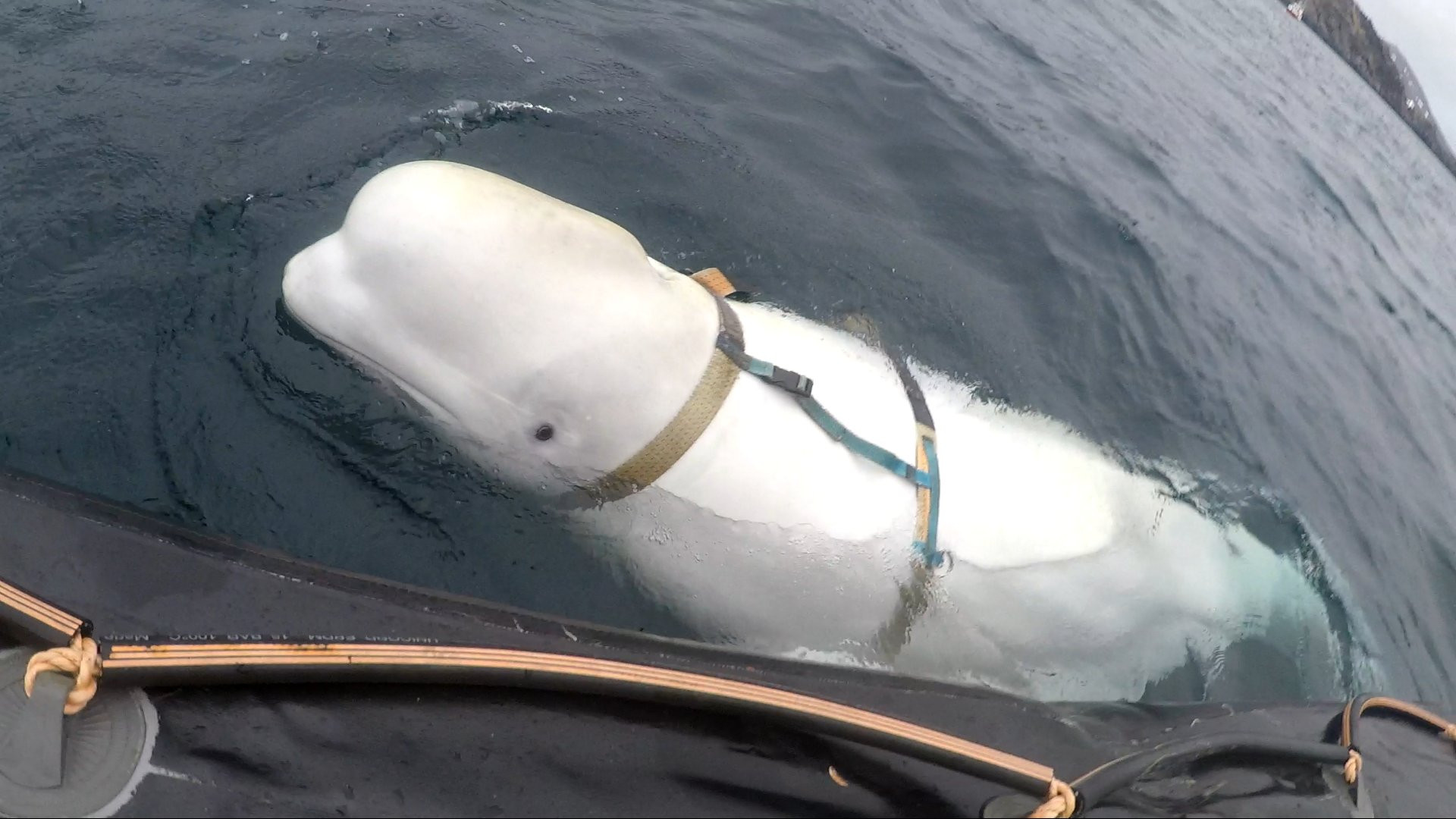A beluga whale suspected of having been trained as a spy by Russia has been found dead off the Norwegian coast. The body of the animal - nicknamed Hvaldimir - was found floating off the south-western town of Risavika and taken to the nearest port for examination. The whale was first spotted in Norwegian waters five years ago with a GoPro camera attached to a harness that read "Equipment of St Petersburg". This sparked rumours the mammal could be a spy whale - something experts say happened in the past. Moscow never responded to the allegations. Hvaldimir's lifeless body was discovered at the weekend by Marine Mind, an organisation that has tracked his movements for years. Marine Mind founder Sebastian Strand told AFP news agency that the cause of death was unknown and that Hvaldimir's body had no obvious injuries. "We've managed to retrieve his remains and put him in a cooled area, in preparation for a necropsy by the veterinary institute," he told AFP news agency. With an estimated age of about 15, Hvaldimir was not old for a Beluga whale, whose lifespan can reach 60 years. He first approached Norwegian boats in April 2019 near the island of Ingoya, about 415km (260 miles) from Murmansk where Russia's Northern Fleet is based. The sighting attracted attention because belugas are rarely seen this far south of the high Arctic. The discovery led to an investigation by Norway's domestic intelligence agency, which later said that the whale was likely to have been trained by the Russian army as he seemed accustomed to humans. The whale became known locally as Hvaldimir, a pun on the Norwegian word for whale, "hval", and President Vladimir Putin. Russia has a history of training marine mammals such as dolphins for military purposes and the Barents Observer website has identified whale pens near naval bases in the north-west area of Murmansk. Russia has never officially addressed the claim that Hvaldimir may have been trained by the Russian military. It has previously denied the existence of any programmes seeking to train sea mammals as spies.
For a supposed spy, Hvaldimir was anything but covert. The white beluga whale had appeared regularly along the coast of Norway since it was first spotted in the country’s north in April 2019, wearing a harness and what appeared to be a mount for a small camera. Together with a buckle that read “Equipment St. Petersburg,” that prompted speculation that it was an escaped “spy whale” that had been trained for military purposes in neighboring Russia. The whale seemed to love being around people and quickly captivated local residents, who came up with the name Hvaldimir — a combination of the Norwegian word for whale, “hval,” and the first name of Russian President Vladimir Putin.
The 14-foot, 2,700-pound whale was found dead Saturday in the harbor of Stavanger, a city in southwestern Norway, after having resided in the area since last year, the Norwegian Directorate of Fisheries said in a statement Monday. Marine biologist Sebastian Strand, who had tracked Hvaldimir’s adventures for the nonprofit organization Marine Mind, said that he discovered the whale while he was out scouting for it and that he was “heartbroken.” “He meant more than I can put into words, to me, to the team and to thousands of people whose lives he had profoundly impacted,” Strand said, adding that Hvaldimir was known to be alive as recently as Friday. “We were responding to a sighting but did not know anything happened to him,” he said. Strand said that Hvaldimir had only superficial injuries and that the cause of death was unclear. An autopsy was being performed Monday, the fisheries directorate said.
Even as residents speculated that Hvaldimir might be on a clandestine mission for the Kremlin, Moscow never claimed the alleged Russian operative as its own. The military use of marine animals is well-documented. Navies around the world, including those of the Soviet Union and the U.S., famously sought to tame cetaceans for spy missions during the Cold War, training them to retrieve underwater objects and detect mines and even take part in defense operations. But Hvaldimir could also have been a therapy whale, according to other theories, which could explain his interest in people and responses to hand signals. “It appeared as if Hvaldimir arrived in Norway by crossing over from Russian waters, where it is presumed he was held in captivity,” Marine Mind says on its website. The whale’s solitude and behavior were atypical for its species, which generally moves in groups and inhabits remote Arctic areas. Hvaldimir was known to be a fan of catamarans around Norway, regularly following them from one fish farm to another, and hunting for food underneath the fishing nets. “He has stayed close to fish breeding farms, and has been able to catch fish that graze on surplus feed from the farms,” the fisheries directorate said. Over the years, Hvaldimir’s movements around densely populated areas had raised concerns about the risk of injury from boats and fishing gear. “For now, we work towards a final dignity of making sure he is kept well and examined so his death will not be a mystery,” Strand said. “But no matter what now, a beloved friend of many is gone.”
This article was originally published on NBCNews.com HELSINKI — A white beluga whale named “Hvaldimir,” first spotted in Norway not far from Russian waters with a harness that ignited rumors he may be a Moscow spy, has been found dead. The Norwegian public broadcaster NRK reported that the whale carcass was found floating at the Risavika Bay in southern Norway Saturday by a father and son who were fishing. The beluga, named by combining the Norwegian word for whale—hval—and Russian President Putin’s first name Vladimir, was lifted out of the water with a crane and taken to a nearby harbor where experts will examine it.
“Unfortunately, we found Hvaldimir floating in the sea. He has passed away but it’s not immediately clear what the cause of death is,” marine biologist Sebastian Strand told NRK, adding that no major external injuries were visible on the animal. Strand, who has monitored Hvaldimir’s adventures for the past three years on behalf of the Norway-based Marine Mind non-profit organization, said he was deeply affected by the whale’s sudden death. “It’s absolutely horrible,” Strand said. “He was apparently in good condition as of (Friday). So we just have to figure out what might have happened here.” The 4.2-meter (14-foot) long and 1,225-kilogram (2,700-pound) whale was first spotted by fishermen near the northern island of Ingøya, not far from the Arctic city of Hammerfest, in April 2019 wearing a harness and what appeared to be a mount for a small camera and a buckle marked with text “Equipment St. Petersburg.” That sparked allegations that the beluga was “a spy whale.” Experts said the Russian navy is known to have trained whales for military purposes. Over the years, the beluga was seen in several Norwegian coastal towns and it quickly became clear that he was very tame and enjoyed playing with people, NRK said. NGO Marine Mind said on its site that Hvaldimir was very interested in people and responded to hand signals. “Based on these observations, it appeared as if Hvaldimir arrived in Norway by crossing over from Russian waters, where it is presumed he was held in captivity,” it said. Norwegian media have speculated whether Hvaldimir could have been used as “a therapy whale” of some sort in Russia.
Contact us at [email protected] Body of Hvaldimir taken to harbour for expert examination after being discovered in Risavika Bay
A beluga whale nicknamed Hvaldimir, first spotted in Norway not far from Russian waters while wearing a harness that prompted rumours he might be a spy for Moscow, has been found dead. The Norwegian public broadcaster NRK reported that the whale’s body was found floating in the Risavika Bay in southern Norway on Saturday by a father and son who were fishing. The beluga, whose nickname was a combination of the Norwegian word for whale – hval – and the first name of the Russian president, Vladimir Putin, was lifted out of the water by crane and taken to a nearby harbour, where experts will examine it. The marine biologist Sebastian Strand told NRK: “Unfortunately, we found Hvaldimir floating in the sea. He has passed away, but it’s not immediately clear what the cause of death is.” He added that no major external injuries were visible on the animal. Strand, who has monitored Hvaldimir’s adventures for the past three years on behalf of the Norway-based non-profit organisation Marine Mind, said he was deeply affected by the whale’s sudden death. “It’s absolutely horrible,” Strand said. “He was apparently in good condition as of [Friday], so we just have to figure out what might have happened here.”
Sign up to Headlines Europe
A digest of the morning's main headlines from the Europe edition emailed direct to you every week day
after newsletter promotion
The 4.2-metre (14ft), 1,225kg (2,700lb) whale was first spotted in April 2019 by fishers near the northern island of Ingøya, not far from the Arctic city of Hammerfest. He was wearing a harness and what appeared to be a mount for a small camera and a buckle marked with the words “Equipment St Petersburg”. That sparked allegations the beluga was a “spy whale”. Experts have said the Russian navy is known to have trained whales for military purposes. Over the years, the beluga was seen in the waters off several Norwegian coastal towns and it quickly became clear that he was very tame and enjoyed playing with people, NRK said. Marine Mind said on its site that Hvaldimir was very interested in people and responded to hand signals. “Based on these observations, it appeared as if Hvaldimir arrived in Norway by crossing over from Russian waters, where it is presumed he was held in captivity,” it said. Because of this behaviour, Norwegian media have also speculated that Hvaldimir may have been used as “a therapy whale” of some sort in Russia.
The white beluga was found off the southwest coast at Risavika Bay by a father and son who were out fishing.
A beluga whale nicknamed Hvaldimir, after his strange harness prompted suspicions he was a Russian spy, has been found dead in the southwest of Norway. The whale’s carcass was discovered floating off Risavika Bay in southern Norway on Saturday by a father and son who were out fishing, Norwegian public broadcaster NRK reported. “Hvaldimir was not just a beluga whale; he was a beacon of hope, a symbol of connection, and a reminder of the deep bond between humans and the natural world,” Marine Mind, a nonprofit organisation that had been tracking his movements, said on social media. Hvaldimir, a combination of the Norwegian word for whale, “hval”, and the first name of Russia’s President Vladimir Putin, was first spotted off Norway’s far northern coast in 2019. His man-made harness, with what appeared to be a mount for a camera stamped with the words “Equipment St Petersburg”, fuelled speculation that he was a “spy whale“. Norwegian officials said Hvaldimir may have escaped an enclosure and been trained by the Russian navy as he appeared to be accustomed to humans. Moscow has never responded to the speculation. After Hvaldimir was found dead, his carcass was lifted out of the water with a crane and taken to a nearby harbour for further examination. “We’ve managed to retrieve his remains and put him in a cooled area, in preparation for a necropsy by the veterinary institute that can help determine what really happened to him,” marine biologist Sebastian Strand told NRK, adding that no major external injuries were visible on the animal. Strand, who has monitored Hvaldimir’s adventures for the past three years on behalf of Marine Mind, said he was deeply affected by the whale’s sudden death. “It’s absolutely horrible,” Strand said. “He was apparently in good condition as of [Friday). So we just have to figure out what might have happened here.” Hvaldimir was 4.2 metres (14ft) long, weighed 1,225kg (2,700 pounds) and was thought to be between 14 and 15 years old. Over the past five years, he had been seen in several Norwegian coastal towns and it was clear that he was very tame and enjoyed playing with people, NRK said. Norwegian media speculated that rather than being a “spy whale”, Hvaldimir had actually been a “therapy whale” of some kind. Beluga whales, whose habitat is the northern waters of Greenland, Norway and Russia, usually live to between 40 and 60 years of age.

















